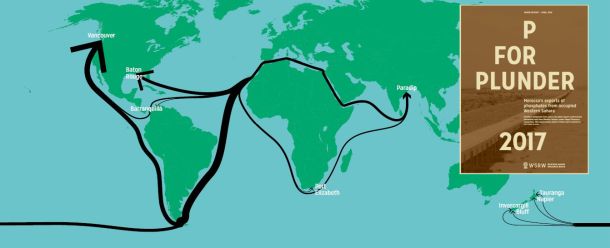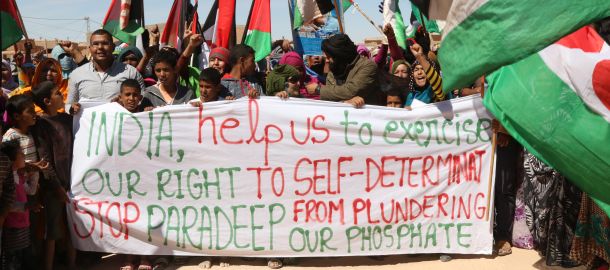
For the eleventh year in a row, Western Sahara Resource Watch publishes a detailed, annual overview of the companies involved in the purchase of conflict phosphates from occupied Western Sahara.
Photo: The vessel Pacific Activity observed in the Red Sea in April 2023, at 23°10'N, 036°54'E, heading from occupied Western Sahara towards the port of Paradip in India. It carried approximately 60,500 tonnes of phosphate rock.
All life on the planet, and so all agricultural production, depends on phosphorus, P. The element is found in phosphate rock and turned into fertilisers. For the people of Western Sahara, their P does not grow into benefits. It’s rather the opposite.
The illegally exploited phosphate rock is one of the Moroccan government’s main sources of income from the territory it holds contrary to international law. The Saharawi people have been consistently outspoken against the trade, both in the UN and to specific companies.
Western Sahara Resource Watch (WSRW) monitors the trade from the occupied territory on a daily level, and has done so for the last decade. For the eleventh year in a row, WSRW today publishes a detailed, annual overview of the companies involved in the purchase of phosphates from occupied Western Sahara.
Download the report P for Plunder 2024 here.
The list we present in this report is complete for calendar year 2023, naming all shipments of phosphates from the territory. The report shows that a total of 29 vessels departed Western Sahara in 2023 with approximately 1.6 million tonnes of phosphate rock, a slight increase from the 1.23 million tonnes of 2022.
Morocco has since 2021 carried out large investments in the port and in the Bou Craa facilities. Since the occupation began in 1975, Morocco has only sold raw phosphate rock. In a few years from now, the phosphates will also be exported in a more valuable, processed form. This will make the trade more lucrative in the future. Morocco’s income from the Bou Craa mine has risen significantly since 2021, particularly as a consequence of Russia’s invasion of Ukraine. It is hard to know the exact value of the trade, but WSRW guesses it could be around 400 million USD for the year of 2023.
The massive exports to Mexico that began in July 2021, continued throughout 2022 and 2023. The importer in Mexico had announced in 2018 that it had stopped such imports due to its “commitment to overall social responsibility”, yet now fails to respond to inquiries. The imports to Mexico and India constitute around 86 percent of the entire trade in Western Sahara’s prime conflict mineral.
In New Zealand, a record low trade was observed for Ravensdown. Ballance Agri-Nutrients shows the opposite trend, with a continued high level of imports. 2023 saw also one small shipment to Japan. That’s it.
WSRW has never before recorded as few clients during a calendar year as in 2023.
WSRW calls on all companies involved in the trade to immediately halt all purchases and all shipments of Western Sahara phosphates until a solution to the conflict has been found. Investors are requested to engage or divest unless action is taken.
Since you're here....
WSRW’s work is being read and used more than ever. We work totally independently and to a large extent voluntarily. Our work takes time, dedication and diligence. But we do it because we believe it matters – and we hope you do too. We look for more monthly donors to support our work. If you'd like to contribute to our work – 3€, 5€, 8€ monthly… what you can spare – the future of WSRW would be much more secure. You can set up a monthly donation to WSRW quickly here.
New report: Western Sahara phosphate trade halved
The export of phosphate rock from occupied Western Sahara has never been lower than in 2019. This is revealed in the new WSRW report P for Plunder, published today.
New report on Western Sahara phosphate industry out now
Morocco shipped 1.93 million tonnes of phosphate out of occupied Western Sahara in 2018, worth an estimated $164 million, new report shows. Here is all you need to know about the volume, values, vessels and clients.
New report on contentious Western Sahara phosphate trade
Morocco shipped over 1.5 million tonnes of phosphate out of occupied Western Sahara in 2017, to the tune of over $142 million. But the number of international importers of the contentious conflict mineral is waning, WSRW's annual report shows.
New report on global phosphate trade from occupied Western Sahara
Over 200 million dollars worth of phosphate rock was shipped out of occupied Western Sahara last year, a new report from WSRW shows. For the first time, India is among the top importers.



